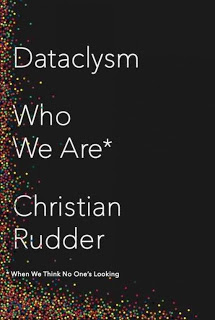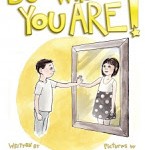If I were not already happily employed at Halifax Public Libraries, high on my Dream Job List would be to work in Data Analysis at OkCupid. And if your reaction to that sentiment was anything akin to, “Yes! Me too! That sounds awesome!” then I urge you to immediately stop reading this blog post and go pick up Dataclysmby OkCupid co-founder Christian Rudder.
If, on the other hand, you are currently thinking “That sounds really boring,” or “What’s OkCupid?” or even, “What’s data?” then, please, read on, and I will enlighten you.
 OkCupid is one of the many online dating services populating the vast expanse of the Internet. While not an online dater myself, I have been fascinated with OkCupid in particular, primarily because of Rudder’s blog, OkTrends. What Rudder realized is that every profile created on his site left him with vast amounts of information about age, sex, race, likes/dislikes, etc. By analyzing this data in creative ways, he revealed many intriguing (and at times, counter-intuitive) patterns about human behavior in the dating world. Since online dating also begins with a certain level of anonymity, users are free to act as they please, without constraints of politeness and even decency. Observations in the book include: the ideal length of an opening message, what age is most attractive to various groups, and speculations on why polarizing profiles tend to get top responses. Much of the book also reveals and highlights vast discrepancies in what OkCupid users say they want versus their actual behavior on the site.
OkCupid is one of the many online dating services populating the vast expanse of the Internet. While not an online dater myself, I have been fascinated with OkCupid in particular, primarily because of Rudder’s blog, OkTrends. What Rudder realized is that every profile created on his site left him with vast amounts of information about age, sex, race, likes/dislikes, etc. By analyzing this data in creative ways, he revealed many intriguing (and at times, counter-intuitive) patterns about human behavior in the dating world. Since online dating also begins with a certain level of anonymity, users are free to act as they please, without constraints of politeness and even decency. Observations in the book include: the ideal length of an opening message, what age is most attractive to various groups, and speculations on why polarizing profiles tend to get top responses. Much of the book also reveals and highlights vast discrepancies in what OkCupid users say they want versus their actual behavior on the site.
I found everything in this book fascinating, and while many of the concepts are actually quite advanced, Rudder maintains a conversational tone and translates sophisticated mathematical terms into relatable analogies. Many of Dataclysm’s observations have far-reaching implications about important social issues, such as latent sexism and racism, and Rudder performs an admirable balancing act of reporting objective findings and theorizing about possible implications.
 If you’re looking for more books about dating and romance in the 21st century, I also recommend Modern Romanceby comedian Aziz Ansari. Rather than writing a traditional humor book, Ansari teamed up with sociologist Eric Klinenberg to carry out a long term multi-faceted research study. The book is still very funny and is peppered with Ansari’s unique viewpoint and personal anecdotes, but it is also well-researched and informative. Though Dataclysm was sourced heavily in writing Modern Romance, Ansari’s book expands its scope beyond the online.
If you’re looking for more books about dating and romance in the 21st century, I also recommend Modern Romanceby comedian Aziz Ansari. Rather than writing a traditional humor book, Ansari teamed up with sociologist Eric Klinenberg to carry out a long term multi-faceted research study. The book is still very funny and is peppered with Ansari’s unique viewpoint and personal anecdotes, but it is also well-researched and informative. Though Dataclysm was sourced heavily in writing Modern Romance, Ansari’s book expands its scope beyond the online.



